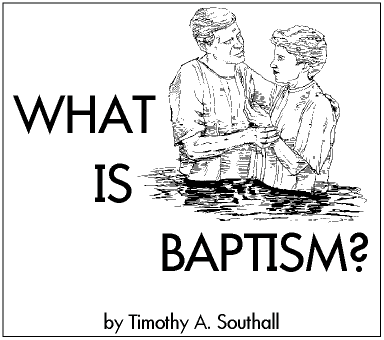
|
Please note:
Each scripture is linked to The Bible Gateway. Scriptures will open
in a separate window in your browser while this window will also remain
open. You can click back and forth between the two windows.
Once you have read the scripture(s), you can close that window.
|
First, we need to know who commanded individuals
to be baptized and why. The last thing Jesus said before He ascended into
heaven was what is commonly referred to as "the great commission:"
| Then the eleven disciples went to Galilee,
to the mountain where Jesus had told them to go. When they saw him, they
worshiped him; but some doubted. Then Jesus came to them and said, "All
authority in heaven and on earth has been given to me. Therefore go and
make disciples of all nations, baptizing them in the name of the Father
and of the Son and of the Holy Spirit, and teaching them to obey everything
I have commanded you. And surely I am with you always, to the very end
of the age." –Matthew
28:16-20 (NIV)
Whoever believes and is baptized will
be saved, but whoever does not believe will be condemned. –Mark
16:16 (NIV) |
It was Jesus who commanded that we are to be baptized
so we can become His disciples and be saved.
Doing what Jesus commanded us to do is doing the
will of God. Jesus said if we love Him, we will obey His commands (John
14:15, 23; 1
John 5:1-3). He also said that those who don't love
Him won't obey His teachings (John
14:24). If we obey Him, we will remain in His love
(John
15:10). Whoever obeys Jesus lives in Him (1
John 3:24). Do you love Him?
Those who know Jesus obey what He commands (1
John 2:3). If we obey Jesus' commandments, it pleases
Him and we receive from Him what we ask (1
John 3:22). Jesus commanded the we be baptized.
Baptism is required in order to receive the gift
of the Holy Spirit (Acts
2:38). Only those who obey Jesus will receive the
Holy Spirit (John
14:15-16;
Acts
5:32).
Baptism is when your sins are forgiven and washed
away (Acts
22:16). Baptism saves you and is a pledge of a good
conscience toward God (1
Peter 3:18-21). Baptism is when we are buried with
Christ to be raised to a new life in Christ (Romans
6:3-4; Colossians
2:12). Baptism is when we enter into Christ (1
Corinthians 12:13;
Galatians
3:27).
In every conversion in the Bible, the individual
or individuals were baptized. The 3,000 on the day of Pentecost (Acts
2:14-41), the Samaritans (Acts
8:9-12), the Ethiopian eunuch (Acts
8:26-39), Saul/Paul
(Acts
9:1-19; Acts
22:3-16), Cornelius and his household
(Acts
10:44-48), Lydia (Acts
16:11-15), the jailer (Acts
16:16-34), the Corinthians (Acts
18:1-8), and the Ephesians
(Acts
19:1-7) were baptized.
Who are the biblical candidates for baptism? In Mark
16:16, the Bible teaches that those who believe and are
baptized will be saved. Belief is required before one is baptized. In Acts
2:38, God's Word says to repent and be baptized. Repentance
is required before one is baptized. 1
Peter 3:21 states that baptism is the pledge of a good conscience
toward God. These scriptures indicate that those who believe in Christ,
repent of their sins, and are aware of their conscience toward God are
candidates for baptism.
Baptism is done by immersing in water. The word baptized
is translated from the original Greek word baptizo, which means
to immerse, submerge, dip, plunge. Baptizo does not mean sprinkle
or pour (like some may want you to believe). If Jesus had wanted people
to have water sprinkled on them, He would have had the early church writers
inspired to use the Greek word rhantizo. If Jesus had wanted people
to have water poured on them, He would have had the early church writers
inspired to use the Greek word
katacheo. But He didn't. They were
inspired to use the word baptizo, which means to immerse. The Bible
is the inspired Word of God (2
Timothy 3:16-17).
As one can see, baptism (immersion in water) is biblical.
Have you been obedient to Christ? Have you been baptized the one and only
biblical way? Have your sins been washed away? Have you entered into Christ?
Copyright © 2005 Timothy A. Southall.
All rights reserved.
|

